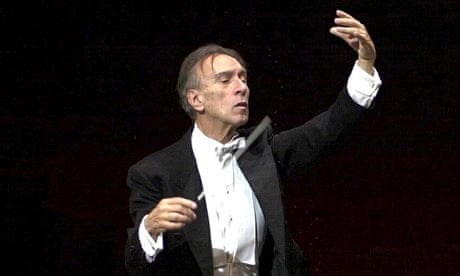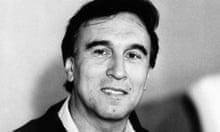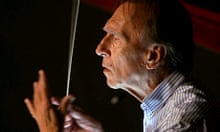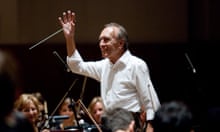Claudio Abbado, who has died aged 80, was not only among the greatest of conductors; in his last decade, after suffering from very severe illness, he raised a superband of players all gathered together for his sake, the Lucerne Festival Orchestra, to heights that many listeners have never experienced in other orchestral concerts. A recording producer defined his special gift as a sense of "absolute pulse" – more precisely, an unerring sense of the right and natural tempo relations in a piece that could give shape and meaning even to the most seemingly amorphous of works, and within that a supple life to the individual musical phrases that no contemporary has equalled. He also rejected what he called the "ghettoisation" of music and refused to make a special case for "modern" music as a thing apart: he was as ardent a champion of many living composers as of Brahms or Debussy.
Reserved and economical of gesture in rehearsal, frequently inspirational in performance, he regarded conversation about his profession as a poor means of communicating about the act of music-making. He was surely right; his achievements at the head of the Vienna and Berlin Philharmonic orchestras, which elect their chief conductors, and then of the Lucerne ensemble speak for themselves.
He was born into a musical family in Milan. His mother, Maria, gave him his first piano lessons when he was eight years old; his father, Michelangelo, was a violinist and teacher at the city's Giuseppe Verdi Conservatory, where Claudio followed his older brother Marcello, now a distinguished pianist and composer, as a student of piano, conducting and composition. Graduating from the conservatory in 1955, he spent the next summer at the masterclasses of Siena's Accademia Chigiana. There another promising student, Zubin Mehta, recommended him to his teacher at the Vienna Music Academy, Hans Swarowsky, whose mathematical approach Abbado was later to value for laying firm foundations and freeing him to concentrate on interpretation.
Abbado also benefited from the more general lessons of great masters in Vienna. In Milan, he had seen Furtwängler and Toscanini conduct; now he and Mehta joined the bass section of the Vienna Singverein exclusively to learn from the technique of Herbert von Karajan. In 1958, the year of his graduation from the academy, he travelled to Tanglewood in the US to participate in the Koussevitzky prize competition andon his own admission was astonished to come first.
Success, however, was still not immediate; after making his operatic debut that same year conducting Prokofiev's Love for Three Oranges in Trieste and a first appearance at the Milan's Piccolo Scala in a concert in 1960 to celebrate the 300th anniversary of the birth of Alessandro Scarlatti, he turned to teaching – partly to support his new wife, Giovanna Cavazzoni, and their two children, Daniele and Alessandra. As the post was to take charge of chamber music at the Parma Conservatoire, he learned invaluable lessons about listening to other musicians and lost no time in familiarising his Italian students with scores by Schoenberg, Bartók and Stravinsky.
Then, in 1963, he returned to America for another competition given in the name of Dimitri Mitropoulos; this time, he later declared, he conducted badly, the award of (joint) first prize was wrong and the whole experience revealed the iniquities of the competition system.
The real turning point came not with his subsequent appearance with the New York Philharmonic but two years later, when at Karajan's invitation he chose to perform Mahler's Second (Resurrection) Symphony with the Vienna Philharmonic at the Salzburg Festival.
The large-scale late romantic symphony was to become one of the pillars on which his reputation was established, and launched his last Mahler series in Lucerne; two others followed in the shape of a contemporary opera – Giacomo Manzoni's Nuclear Death – and Bellini's I Capuleti e I Montecchi, both of which he subsequently conducted at La Scala. Milan was not slow to offer him the post of principal conductor there, which he took up in 1968; the titles of music director and artistic director followed in 1972 and 1976 respectively.
Strengthening the backbone of the Scala orchestra with an injection of non-Italian players, he encouraged it to look beyond the confines of Italian opera to the wider symphonic repertoire and even to chamber music. Even so, he never lost sight of its essential Italianate singing quality and refused to record Verdi with any other orchestra – a conviction to which his 1977 recording of Simon Boccanegra is perhaps the finest testament. At the same time, other opera houses were to benefit from his supremely flexible Verdi conducting; he made his debut at London's Royal Opera in 1968 with Don Carlos.
Establishment infighting took its toll on the conscientious and introspective Abbado; he resigned several times in the 1970s when La Scala politics threatened to overwhelm him. A shorter course in opera-house politics came in 1991 when he gave up his two-year post as music director of the notoriously difficult Vienna State Opera on grounds of ill-health (though he continued to serve as artistic consultant). Yet his achievements here, too, were outstanding – above all new productions of Mussorgsky's Khovansh- china and Berg's Wozzeck, both recorded for posterity – and his relationship with the Vienna Philharmonic, which also serves as the opera's orchestra, had been well established since 1971.
Three collaborations with younger ensembles brought out the best in Abbado, as they were to do in Lucerne when he conducted the Simón Bolívar Youth Orchestra of Venezuela. He united the Chamber Orchestra of Europe and an outstanding roster of international singers in Rossini's effervescent but then-neglected Il Viaggio a Reims at the 1985 Pesaro festival; the resultant recording proved a bestseller and remains a desert-island set for many opera lovers. When he took over as music director of the European Community Youth Orchestra in 1977, the astonishing results they achieved together came from a training and dedication few other international conductors would be willing to offer. The orchestra's organiser, Joy Bryer, has spoken about his concern for the individual welfare of the young players and his tireless attempts to help them in their careers after their time in the ECYO. In 1986 he established another ensemble for whom no allowances of age and inexperience ever needed to be made, the Gustav Mahler Youth Orchestra; their Mahler Fourth and Ninth Symphony performances are, happily, preserved on DVD.
Abbado would have been the first to place his concerts with the ECYO as equal in importance to his long-term work with three major orchestras. In 1979 he celebrated his appointment as principal conductor of the London Symphony Orchestra with a typically electrifying concert of Brian Ferneyhough, Brahms – the First Piano Concerto, with his long-term concerto partner Maurizio Pollini – and Tchaikovsky, to whose symphonies he always brought a bel canto beauty of line. His programmes in the orchestra's Mahler, Vienna and the Twentieth Century series were both eclectic and logical; on one evening, the Adagio from the Tenth Symphony and Debussy's Nocturnes shared an elusive tonal incandescence that will never be forgotten by those who heard it.
Even so, the Vienna Philharmonic remained Abbado's ideal instrument for Mahler, and in 1990 he moved on to the greatest challenge of his careerr at that time – moulding the life of the Berlin Philharmonic after the Karajan years. On the face of it, the changes in Berlin were obvious – to extend the orchestra's repertoire beyond the late romantic core which had been Karajan's element. Although Abbado would voice his reservations about visiting conductors who expected to shine in the standard works for which the orchestra had become famous rather than to challenge audiences with anything new, he was in a unique position to do both. His intensive work with promising musicians continued in the Berlin Encounters concerts of the annual Berlin festival, created in conjunction with the cellist Natalia Gutman – who later, and surely uniquely for the finest of soloists, played in his Lucerne orchestra – to bring together young instrumentalists with established professionals.
Musical life in Berlin was not always plain sailing; Abbado was wounded, as ever, by critical campaigns against his integrity and his work with the orchestra. There was sometimes a feeling in his later performances and recordings that the old, familiar sense of challenge had gone gentle; his Mahler Eighth Symphony in Berlin, for example, proved a surprisingly soft-grained conclusion to a Mahler cycle on disc that had begun with a far greater sense of dynamism (it was the only Mahler symphony he would later fail to conduct in Lucerne, where an advertised performance was pulled and replaced by the Mozart Requiem). On the other hand, the Brahms Third Symphony that he brought to London with his orchestra in 1998 still revealed a masterly control of ebb and flow in a work which Abbado had always regarded as one of the most difficult to conduct from the technical point of view. His turning back to Beethoven at the end of a musically rich career was characteristic of the way he was able to blend a self-renewing personal vision of familiar music with a close examination of textual scholarship (in this case Jonathan Del Mar's painstaking edition of the symphonies).
After radical treatment for cancer, Abbado took on a new lease of life by recreating the ideals of a Festival Orchestra in Lucerne in 2003. Not only did this usually laconic figure speak eloquently about how music had given him a burning will to live and how he felt his approach had now deepened; the players he gathered around him raised the whole notion of orchestral solidarity, at a time when the structure was coming under question, to a whole new level.
There were string quartets starting with the Hagen Quartet, top players from the Berlin Philharmonic and other world orchestras and a core of the youth he valued so much in the Mahler Chamber Orchestra. When I met the MCO conductor Daniel Harding at the 2005 festival, he described the big orchestral collaboration as resulting in "not so much a concert as a love-in", treasuring its uniqueness while questioning whether such a situation could possibly last.
It did, through to a Mahler Ninth in 2010 which I cannot be alone in unhesitatingly naming the greatest concert that I have ever heard. There were also a concert Fidelio, and a Bruckner Fifth which the ensemble brought to London in 2011. Sadly, Abbado was too ill to conduct further concerts planned in London. I count myself lucky to have seen a collaboration between the Orchestra Mozart and the Orchestra of Accademia di Santa Cecilia in Rome, where Abbado wrought supernatural magic in Tchaikovsky's The Tempest and was warmly embraced at the end by president Giorgio Napolitano. It came as no surprise when last August Napolitano appointed him senator for life.
Abbado's breadth of interests and curiosity remained a constant: a start had been made on planting the 90,000 magnolias that he suggested for Milan in 2008; later, deeply impressed by Michael Haneke's film The White Ribbon, he earmarked him as the ideal collaborator for a putative production of Berg's Wozzeck.
The awards and honours garnered throughout the conductor's life would be as impossible to list as the number of truly outstanding performances with orchestras and opera companies throughout the world. What remains are the films and the discs, equalling in their mastery and outshining in their breadth those of his equals, Furtwängler and Toscanini.
Abbado's first marriage ended in divorce. He is survived by his second wife, Gabriella Cantalupi, and their son, Sebastiano; by Daniele and Alessandra; by Misha, his son with the violinist Viktoria Mullova; and by his brothers, Marcello and Gabriele, and his sister, Luciana.







Comments (…)
Sign in or create your Guardian account to join the discussion